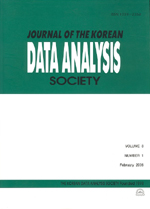임상간호사의 성찰적 사고 수준과 성찰 조건이 간호역량에 미치는 영향
A Study of Reflective Thinking Levels and Conditions for Reflection Affecting on Nursing Competency in Clinical Nurses
- 한국자료분석학회
- Journal of The Korean Data Analysis Society (JKDAS)
- Vol.16 No.6
-
2014.123393 - 3407 (15 pages)
- 250

본 연구는 임상간호사의 성찰적 사고 수준과 성찰 조건이 간호역량에 미치는 영향을 확인하기 위한 서술적 조사연구이다. 2011년 6월부터 7월까지 설문조사를 통해 G광역시 소재 4개의 종합병원 간호사 235명을 최종 분석하였다. 간호역량은 Jang(2000)의 13개 간호역량의 임상등급별 행동지표를 이용하여 측정하였고, 성찰적 사고 수준과 성찰 조건은 Peltier, Hay, Drago(2005)의 성찰적 학습 과정(reflective learning continuum)을 You(2009)가 번역ㆍ수정한 도구를 간호사에 맞게 수정하여 사용하였다. 수집된 자료는 서술적 통계와 t-검정, 분산분석(ANOVA), 피어슨(Pearson)의 상관계수, 후진제거 다중회귀분석을 하였다. 성찰적 사고 수준은 심층적 성찰, 성찰, 이해, 습관적 행위로 구성되는데, 간호사의 성찰적 사고 수준은 심층적 성찰이 가장 높았고 다음으로 성찰, 이해, 습관적 이해의 순서였다. 심층적 성찰과 성찰은 연령, 총 임상경력, 학력이 높은 군이 유의하게 높았으며, 습관적 행위는 연령과 학력이 높은 군이 유의하게 낮았다. 심층적 성찰과 성찰, 성찰의 조건인 동료와의 상호관계와 관리자와의 상호관계는 간호역량과 긍정적 상관관계가 있었고 회귀분석에서 총 임상경력과 성찰은 간호역량의 22.3%의 설명력을 나타냈다. 임상간호사의 성찰적 사고는 간호역량을 향상시키는 중요한 요인이므로 간호사들이 성찰적 사고를 할 수 있도록 교육 및 훈련체계를 마련하고 성찰조건인 실무환경을 능동적이고 협력적인 상호작용이 발생하도록 조성하여야 한다.
The aim of this study was to identify the effect of clinical nurses’ reflective thinking levels and conditions for reflection on nursing competency. Participants were 235 clinical nurses who worked in 4 general hospitals in Gwangju Metropolitan City. Data were collected by self-reporting questionnaires during June and July, 2011. Reflective thinking levels, conditions for reflection and nursing competency measurements were used as measurement tools. Data were analyzed using frequencies, means, t-test, one-way ANOVA, Pearson correlation coefficients, and backward multiple regression. Reflective thinking levels consist of intensive reflection, reflection, understanding, and habitual action. The mean score of intensive reflection was the highest, the next were reflection, understanding and habitual action in order. There were significant differences in intensive reflection and reflection according to age, total clinical career, and educational background. Intensive reflection, reflection, and conditions for reflection correlated positively with nursing competency. Multiple regression analysis showed that total clinical career, reflection explained 22.3% of nursing competency. This finding suggests that total clinical career and reflection are important factors on enhancing nursing competency, thus we recommend that reflective thinking training is a powerful strategy to promote the professional development for nurses.
1. 서론
2. 연구방법
3. 연구결과
4. 논의
5. 결론 및 제언
References
(0)
(0)